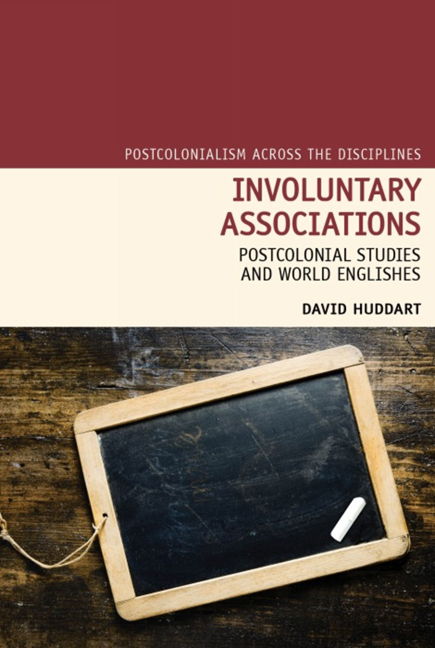Book contents
- Frontmatter
- Dedication
- Acknowledgements
- Contents
- Introduction
- 1 Involuntary Associations: ‘Postcolonial Studies’ and ‘World Englishes’
- 2 Grammars of Living Break their Tense: World Englishes and Cultural Translation
- 3 English in the Conversation of Mankind: World Englishes and Global Citizenship
- 4 Declarations of Linguistic Independence: The Postcolonial Dictionary
- 5 Writing after the End of Empire: Composition, Community, and Creativity
- 6 Slow Reading: The Opacity of World Literatures
- Conclusion: English Remains, Englishes Remain
- Bibliography
- Index
1 - Involuntary Associations: ‘Postcolonial Studies’ and ‘World Englishes’
- Frontmatter
- Dedication
- Acknowledgements
- Contents
- Introduction
- 1 Involuntary Associations: ‘Postcolonial Studies’ and ‘World Englishes’
- 2 Grammars of Living Break their Tense: World Englishes and Cultural Translation
- 3 English in the Conversation of Mankind: World Englishes and Global Citizenship
- 4 Declarations of Linguistic Independence: The Postcolonial Dictionary
- 5 Writing after the End of Empire: Composition, Community, and Creativity
- 6 Slow Reading: The Opacity of World Literatures
- Conclusion: English Remains, Englishes Remain
- Bibliography
- Index
Summary
To develop everywhere, in defiance of a universalizing and reductive humanism, the theory of specifically opaque structures. In the world of cross-cultural relationship, which takes over from the homogeneity of the single culture, to accept this opaqueness – that is, the irreducible density of the other – is to truly accomplish, through diversity, a human objective.
Édouard Glissant, Le Discours AntillaisIntroduction
This chapter juxtaposes postcolonial studies and World Englishes studies, considering what the two disciplines share, as well as how they may differ. It also explores what it means to think about them as ‘disciplines’ in the first place. Accordingly, this chapter is about the act of naming, particularly as it gives shape to or calls into being disciplines, something that Philip Seargeant (2010; 2012) has written about at length in the context of World Englishes. Nonetheless, this chapter does not attempt to fix or freeze these two disciplines, as each is necessarily loosely defined. Furthermore, particularly in the case of postcolonial studies, the process of definition is quite possibly exhausted, with scholars having long ago asked ‘when was’, ‘what is’, etc. Indeed, Emma Dawson Varughese (2012) begins her recent study of World Englishes literature by refusing to make any attempt to redefine ‘the postcolonial’; this refusal is a prerequisite, she argues, for going ‘beyond the postcolonial’, as her book's subtitle puts it. In order to avoid offering fixed, simple definitions of either World Englishes or postcolonial studies, this book will look at diverse case studies that frequently suggest very different things about the connections between the two disciplines. That approach begins here, as this chapter outlines some of the phenomena that give rise to the critical approaches, considers how the approaches differ, and explores the ways in which other writers have begun to bring them together. To begin, let us consider the proposition that the extent of English's spread constitutes a form of ongoing domination that is best described in terms of linguistic imperialism. This diagnosis of linguistic imperialism is part of what is often called the Critical Linguistics approach, but is also and obviously connected with postcolonial approaches, as we will now see.
- Type
- Chapter
- Information
- Involuntary AssociationsPostcolonial Studies and World Englishes, pp. 17 - 31Publisher: Liverpool University PressPrint publication year: 2014



